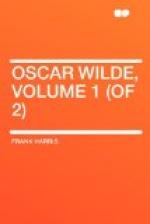On the first evening they met, Mr. Wilde called Parker “Charlie” and Parker called Mr. Wilde “Oscar.” It may be a very noble instinct in some people to wish to break down social barriers, but Mr. Wilde’s conduct was not ordered by generous instincts. Luxurious dinners and champagne were not the way to assist a poor man. Parker would tell them that, after this first dinner, Mr. Wilde invited him to drive with him to the Savoy Hotel. Mr. Wilde had not told them why he had that suite of rooms at the Savoy Hotel. Parker would tell them what happened on arriving there. This was the scandal Lord Queensberry had referred to in his letter as far back as June or July last year. The jury would wonder not at the reports having reached Lord Queensberry’s ears, but that Oscar Wilde had been tolerated in London society as long as he had been. Parker had since enlisted in the Army, and bore a good character. Mr. Wilde himself had said that Parker was respectable. Parker would reluctantly present himself to tell his story to the jury.
All this time the court was hushed with awe and wonder; everyone was asking what on earth had induced Wilde to begin the prosecution; what madness had driven him and why had he listened to the insane advice to bring the action when he must have known the sort of evidence which could be brought against him.
After promising to produce Parker and the others Mr. Carson stopped speaking and began looking through his papers; when he began again, everyone held his breath; what was coming now? He proceeded in the same matter-of-fact and serious way to deal with the case of the youth, Conway. Conway, it appeared, had known Mr. Wilde and his family at Worthing. Conway was sixteen years of age.... At this moment Sir Edward Clarke returned with Mr. Charles Mathews, and asked permission of the judge to have a word or two with Mr. Carson. At the close of a few minutes’ talk between the counsel, Sir Edward Clarke rose and told the Judge that after communicating with Mr. Oscar Wilde he thought it better to withdraw the prosecution and submit to a verdict of “not guilty.”
He minimised the defeat. He declared that, in respect to matters connected with literature and the letters, he could not resist the verdict of “not guilty,” having regard to the fact that Lord Queensberry had not used a direct accusation, but the words “posing as,” etc. Besides, he wished to spare the jury the necessity of investigating in detail matter of the most appalling character. He wished to make an end of the case—and he sat down.
Why on earth did Sir Edward Clarke not advise Oscar in this way weeks before? Why did he not tell him his case could not possibly be won?
I have heard since on excellent authority that before taking up the case Sir Edward Clarke asked Oscar Wilde whether he was guilty or not, and accepted in good faith his assurance that he was innocent. As soon as he realised, in court, the strength of the case against Oscar he advised him to abandon the prosecution. To his astonishment Oscar was eager to abandon it. Sir Edward Clarke afterwards defended his unfortunate client out of loyalty and pity, Oscar again assuring him of his innocence.




